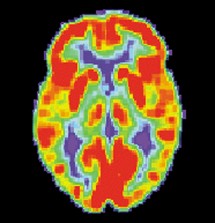The Effect

(Image c/- US Dept. of Health)
(written by Lucy Prebble) (Adelaide University Theatre Guild, 8 October 2016)
A man and a woman – an experienced experimentee and a first timer – sign on as subjects in an anti-depressant trial at Raushen Pharmaceuticals. Who would have thought that two young, flaky people left virtually alone in a closed environment with nothing to do might engage in a little forbidden hanky-panky? Sigh. Unfortunately this rather juvenile play is full of such predictable developments and unsurprising attempts at surprise. Connie and Tristan, the guinea-pigs, escape to a moonlit former insane asylum and bang on about whether unnatural upsurges in dopamine cause love, or vice versa.
Then Laura and Toby, the psychiatrists conducting the trial, bang on about it for a while too. Then they all bang on about how we define “normal” and “mentally ill” and so on. The audience, tapping its feet through all this psychology 101, waits for a revelation – which never comes. In order to try to create suspense, Prebble has taken pointless liberties with the realities of medical protocols and professionalism, which are simply irritating. The first part sets up some hope of interesting developments but the second part is inexplicable and even duller than the first.
The play is poor – however, the crew and cast were not.
David Salter’s performance as Tristan was flawless. Cate Rogers as Dr James was also excellent. Given this unpromising material, however, it is no surprise that at times the cast did struggle. Bronwyn Palmer (Connie) needs experience, which she will no doubt gain in this rather charming and adventurous little theatre. Gary George was too histrionic as Dr Sealey in the small space and showed to advantage best in the scene when he extolls the virtues of psychiatric drugs – a scene which called for gusto and bravura.
Lighting Designer Richard Parkhill’s unfussy lighting was spot-on. His use of brain scans and charts projected onto the walls enhanced and focused attention. Director Megan Dansie’s sparse staging (long benches moved by the actors to spots marked on the stage floor) fitted the (annoyingly) episodic nature of the story and the quick changes of scene. Composer Phil Short’s BBC-news-like music gave urgency to the story when it was needed.
Overall, not a success. To quote the Broadway wasp Ben Brantley on another Prebble effort, it was “lucid to the point of simple-mindedness.” Prebble is known for her left-wing, simplistic, unsynthesised writing and The Effect will only enhance that effect.
Leave a comment...
While your email address is required to post a comment, it will NOT be published.


1 Comment